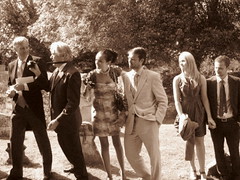Reportage: From Girona to Gatwick
He looked even worse than I felt: apprehensive, a bit unsure about the wisdom of this flight. He had been carrying an anonymous violin case (and when did they become anonymous? They're no longer shaped like the instrument they purport to protect; instead they're as institutionally corporate and dull as any other piece of luggage. It was only because I could see a spare string peeking out that I divined what was inside), but stowed it with a graceful ease, indicative of his profession.
The pony tail was held on top of his head by an aquamarine elastic band. His beard was worth at least three weeks' worth of effort. On his left wrist, her pink hairband, sitting snugly just above the narrowing where the hand is joined. On his right wrist, a string of pearls which kept falling towards his forearm. Now and again he would push it back up, only for it to slide back. In his hands were a purple paper bag, and an A5 notebook, spiral bound, red covered and with squared notepaper.
Looking over his shoulder, expecting the chastisement from the air stewardess for even thinking about committing the offence, he pulled down the tray table then emptied the paper bag on to it. Two sets of photographs, six by four. One had holes punched in the top-left hand corner, and were connected together by a binding of some sort, what I assumed to be a treasury tag; certainly something loose enough to allow him to flick through them, rapidly, then slowly, then rapidly again, like he was drying the drain the images of the pain, while leaving the potency behind, the same way you might hammer a shot in order to feel the buzz, but not the aftermath.
Both sets of photos were of her, mostly, nearly all of them her. In close up, in sepia, in black and white, in a bleached out daylight tone. Often he had tightly cropped on just her smile, or her eyes. These slices of her seemed even more pungent to him, and he would bring these up to his nose and then his eyes, as though the closer sight and faintest smell of her would do something good to him and his memories of what he was leaving behind.
Sometimes she was wearing something. Often she wasn't, and she was unembarrassed by her nakedness around him. He gave her the comfort and the confidence that she could do that, probably for the first time. Her eyes suggested she hadn't done it much.
There were lots of embraces on various beaches, and hence adroit use of what must have been a robust timer: the ability to find a flat surface, allow enough lead time, set it, sprint round, lift her up and hold it until - click. He must have been good at it. At first I thought there must have been a third person there, so skillful were they.
But then, would you allow another person to share those moments?
There was family there too: her mother, a younger sister. Beaming pride on the face of one, suspicion on the other. Or maybe it was jealousy.
On the back of every single photo was a note, written in caps in a thin black felt tip pen. I couldn't read them ('Moby Dick' is a very useful book to disguise your intentions with if and when you are grubbily trying to peruse someone's life story from snatched and discreet glances). The words didn't seem to be about the place and time the shot had been taken; instead the feelings they evoked. I guessed that she'd written them, so that he'd have another hit of nostalgia to inhale. I imagined that they'd be both banal and poetic, as the codes of other lovers are - whereas yours are cryptic and profound, theirs are always baffling and banal. Presumably they were erotic, and erotic enough to keep him in the reverie that she wanted him in: there will be no other like me, who will do to you what I have done to you, who will make you feel how I have made you feel, in one place, in all places, all over.
He put the photos back in the bag, then turned to the notebook. In-between the cover and the first page was a single US dollar bill. He'd been doodling on it. In careful black ink, he'd drawn hearts around the Federal Reserve seal, and sketched some of them in. On the back, above the words 'In God We Trust', he'd written 'I love you'.










